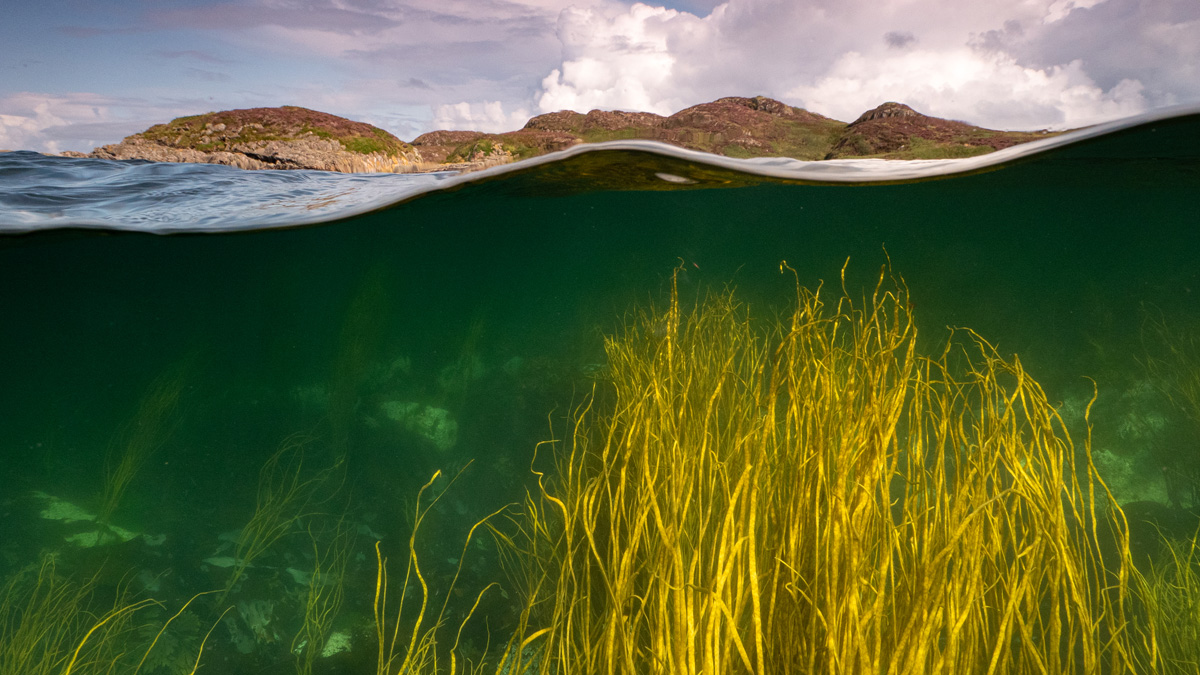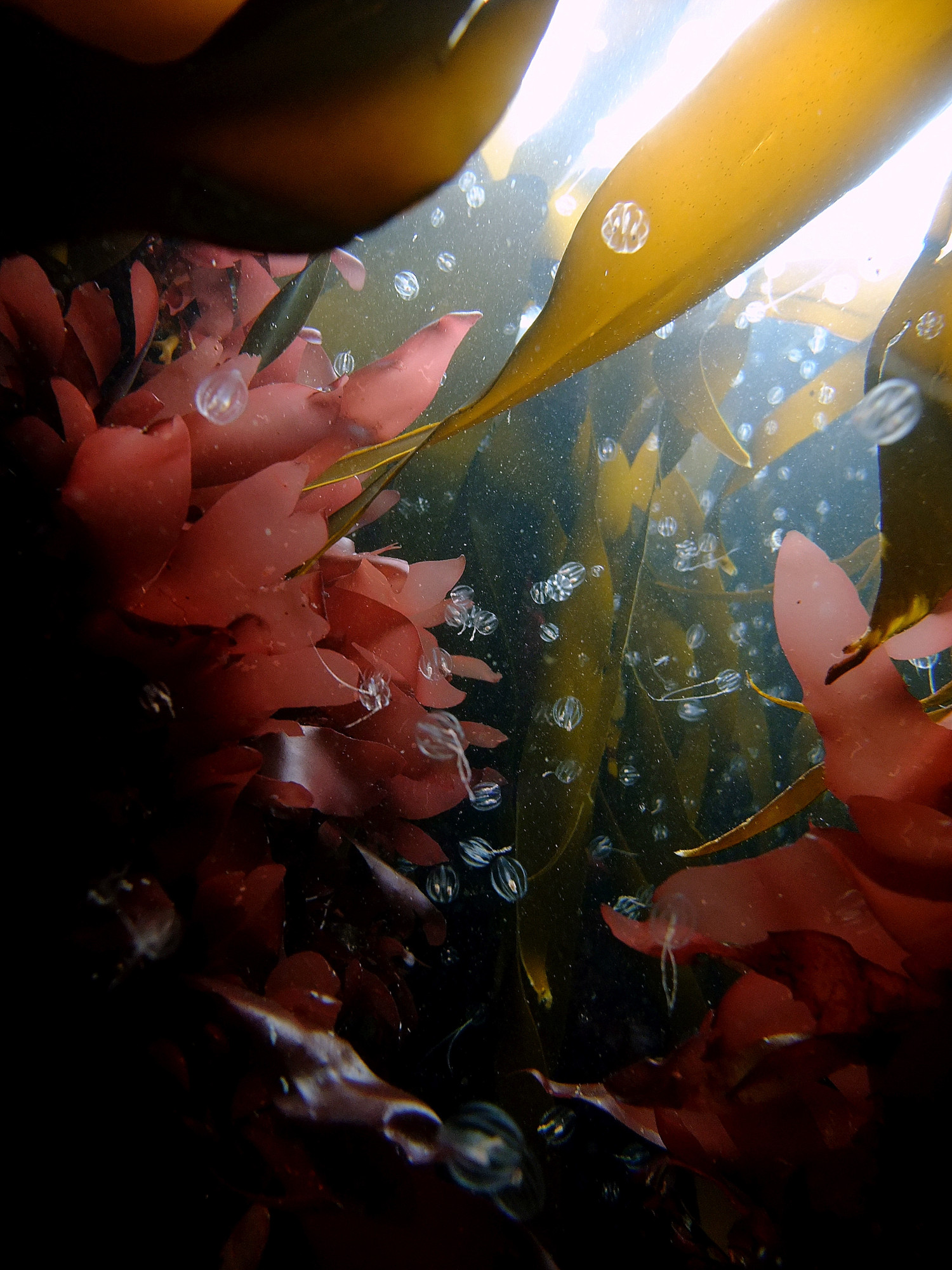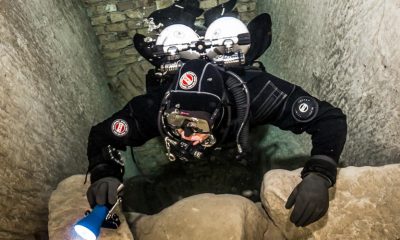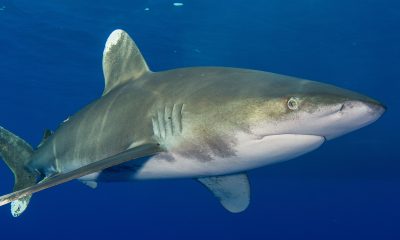Marine Life & Conservation
The ocean’s solution to the climate emergency

 The Marine Conservation Society has released a new report in partnership with Rewilding Britain. Blue Carbon – Ocean-based solutions to fight the climate crisis outlines the importance of the UK’s seas in helping the UK to reach its goal of net zero by 2050, and 2045 for Scotland.
The Marine Conservation Society has released a new report in partnership with Rewilding Britain. Blue Carbon – Ocean-based solutions to fight the climate crisis outlines the importance of the UK’s seas in helping the UK to reach its goal of net zero by 2050, and 2045 for Scotland.
In order to reach net zero, the quantity of carbon dioxide taken from the atmosphere and stored in natural solutions must increase. By protecting and rewilding ecosystems in our ocean, blue carbon stores will have increased capacity and ability to store carbon.
The significant role of the world’s forests in helping to reduce carbon emissions has been formally recognised through numerous initiatives and reforesting projects intended to keep carbon locked into the world’s forests on land. Unfortunately, equivalent solutions in the ocean are often overlooked. In order to reach its goal of net zero by 2050, the UK must look to blue carbon solutions in tandem with those on land.
What is blue carbon?
Marine ecosystems like seagrass meadows, saltmarshes and mangroves absorb or ‘draw down’ carbon from the water and atmosphere, just like plants and trees on land. The storage of carbon in marine habitats is called blue carbon. The storage of blue carbon can be in the plants themselves, like seaweed and seagrass; in the seafloor sediment where plants are rooted; or even in the animals which live in the water, including seabirds, fish and larger mammals. Blue carbon is simply carbon absorbed from the water and atmosphere stored in the world’s blue spaces.
Dr Chris Tuckett, Director of Programmes at the Marine Conservation Society: “Carbon contained in marine and coastal ecosystems must be considered in the same way as our woodlands and peatbogs…critical to the UK’s carbon strategy. Our report outlines how vital blue carbon solutions are to an effective strategy which reaches net zero by 2050.
“We’re calling on the UK Government and devolved administrations to act with urgency to invest in, co-develop and implement a four nation Blue Carbon Strategy.”
The suggested strategy focuses on three key action areas:
– Scaling up marine rewilding for biodiversity and blue carbon benefits
– Integrating blue carbon protection and recovery into climate mitigation and environmental management policies
– Working with the private sector to develop and support sustainable and innovative low-carbon commercial fisheries and aquaculture.
Globally, the rewilding of key blue carbon securing marine and coastal ecosystems such as seagrass beds, saltmarshes and mangroves could deliver carbon dioxide mitigation amounting to 1.83 billion tonnes. That is 5% of the emissions savings we need to make globally. This figure doesn’t include the enormous quantities of carbon stored in fish and other marine life; in marine ecosystems such as coral reefs, seaweeds and shellfish beds; or the vast stores of carbon in our seabed sediments.
Rebecca Wrigley, Rewilding Britain’s Chief Executive: “We’re calling for the rewilding and protection of at least 30% of Britain’s seas by 2030. Allowing a rich rainbow of underwater habitats and their sealife to recover offers huge opportunities for tackling the nature and climate crises, and for benefiting people’s livelihoods,”
“From Dornoch Firth to Lyme Bay, inspiring projects are leading the way by restoring critically important seagrass meadows, kelp forests and oyster beds. Combined with the exclusion of bottom towed trawling and dredging, such initiatives offer hope and a blueprint for bringing our precious seas back to health.”
Later this year, the UK will be hosting COP26 – the UN Climate Change Conference – in Glasgow. The conference brings together world leaders to accelerate action towards the goals of the Paris Agreement and the UN Framework Convention on Climate Change. The ocean and its blue carbon stores are a crucial part of the many urgent and varied solutions required to address the climate crisis.
The UK has committed to significantly increase its spending on nature-based solutions, including those offered by the ocean. The Marine Conservation Society and Rewilding Britain are calling on UK governments to adopt ocean-based solutions at pace and scale by 2030.
The report, Blue Carbon – Ocean-based solutions to fight the climate crisis, is available to read at the Marine Conservation Society’s website.
Header image: Mark Kirkland
Marine Life & Conservation
Double Bubble for Basking Sharks

 The Shark Trust is excited to announce that, for two more days only, all donations, large or small, will be doubled in the Big Give Green Match Fund!
The Shark Trust is excited to announce that, for two more days only, all donations, large or small, will be doubled in the Big Give Green Match Fund!
Donate to Basking in Nature: Sighting Giants
The Shark Trust is hoping to raise £10k which will be doubled to £20k. This will go towards Basking in Nature: Sighting Giants. And they need YOUR help to reach they’re goal.
The Shark Trust’s citizen science project is to monitor and assess basking sharks through sightings; encouraging data collection, community engagement, and promoting nature accessibility. This initiative aims to enhance health and wellbeing by fostering a deeper connection with British Sharks.
Campaign Aims
- Increase citizen science reporting of Basking Sharks and other shark sightings to help inform shark and ray conservation.
- Provide educational talks about the diverse range of sharks and rays in British waters and accessible identification guides!
- Create engaging and fun information panels on how to ID the amazing sharks and rays we have on our doorstep! These can be used on coastal paths around the Southwest. With activities and information on how you can make a difference for sharks and rays!
- Promote mental wellbeing through increasing time in nature and discovering the wonders beneath the waves!
Donate, and double your impact. Click Here
Marine Life & Conservation
Leading UK-based shark conservation charity, the Shark Trust, is delighted to announce tour operator Diverse Travel as a Corporate Patron

 Corporate Patrons provide a valuable boost to the work of The Shark Trust. The Trust team works globally to safeguard the future of sharks, and their close cousins, the skates and rays, engaging with a global network of scientists, policymakers, conservation professionals, businesses and supporters to further shark conservation.
Corporate Patrons provide a valuable boost to the work of The Shark Trust. The Trust team works globally to safeguard the future of sharks, and their close cousins, the skates and rays, engaging with a global network of scientists, policymakers, conservation professionals, businesses and supporters to further shark conservation.
Specialist tour operator Diverse Travel has operated since 2014 and is committed to offering its guests high quality, sustainable scuba diving holidays worldwide. Working together with the Shark Trust will enable both organisations to widen engagement and encourage divers and snorkellers to actively get involved in shark conservation.
“Sharks are truly at the heart of every diver and at Diverse Travel, we absolutely share that passion. There is nothing like seeing a shark in the wild – it’s a moment that stays with you forever!” says Holly Bredin, Sales & Marketing Manager, Diverse Travel.
“We’re delighted to celebrate our 10th year of business by becoming a Corporate Patron of the Shark Trust. This is an exciting partnership for Diverse and our guests. We will be donating on behalf of every person who books a holiday with us to contribute towards their vital shark conservation initiatives around the world. We will also be working together with the Trust to inspire divers, snorkellers and other travellers to take an active role – at home and abroad – in citizen science projects and other activities.”
Paul Cox, CEO of The Shark Trust, said:
“It’s an exciting partnership and we’re thrilled to be working with Diverse Travel to enable more divers and travellers to get involved with sharks and shark conservation. Sharks face considerable conservation challenges but, through collaboration and collective action, we can secure a brighter future for sharks and their ocean home. This new partnership takes us one more valuable step towards that goal.”
For more information about the Shark Trust visit their website here.
For more about Diverse Travel click here.
-

 News3 months ago
News3 months agoHone your underwater photography skills with Alphamarine Photography at Red Sea Diving Safari in March
-

 News3 months ago
News3 months agoCapturing Critters in Lembeh Underwater Photography Workshop 2024: Event Roundup
-

 Marine Life & Conservation Blogs2 months ago
Marine Life & Conservation Blogs2 months agoCreature Feature: Swell Sharks
-

 Blogs2 months ago
Blogs2 months agoMurex Resorts: Passport to Paradise!
-

 Blogs2 months ago
Blogs2 months agoDiver Discovering Whale Skeletons Beneath Ice Judged World’s Best Underwater Photograph
-

 Gear Reviews3 months ago
Gear Reviews3 months agoGear Review: Oceanic+ Dive Housing for iPhone
-

 Marine Life & Conservation2 months ago
Marine Life & Conservation2 months agoSave the Manatee Club launches brand new webcams at Silver Springs State Park, Florida
-

 News3 months ago
News3 months agoWorld’s Best Underwater Photographers Unveil Breathtaking Images at World Shootout 2023




















